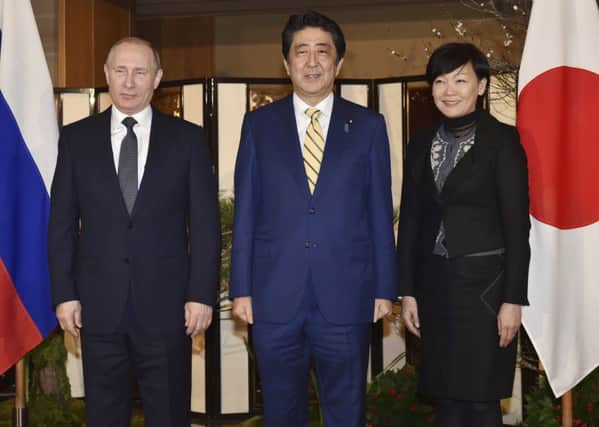Russia and Japan discuss dispute over territory


For Russian president Vladimir Putin, the summit meeting in Nagato city marks his first official visit to a G7 country since Russia annexed Crimea in 2014.
Japanese prime minister Shinzo Abe invited Mr Putin even though the G7 nations, including Japan, still have sanctions on Russia. The talks will move to Tokyo tomorrow.
Advertisement
Hide AdAdvertisement
Hide AdMr Abe said he and Mr Putin spent much of their three-hour meeting discussing the dispute over four islands seized by the former Soviet Union in the closing days of the Second World War, and a peace treaty officially ending the two countries’ wartime hostilities. A major breakthrough is seen as unlikely.
The disagreement over the four southern Kuril islands, which Japan calls the Northern Territories, has kept the two countries from signing a peace agreement.
“We had in-depth discussions on a peace treaty,” Mr Abe said.
He said the two leaders also discussed possible joint economic projects on the disputed islands. Mr Abe hopes such economic cooperation will help solve the territorial dispute and bolster ties.
Mr Abe did not say if there was any progress on the territorial issue.
In brief remarks before the meeting, Mr Abe told Mr Putin that the hot spring waters of Nagato are famous for relieving fatigue.
“I can guarantee you that the hot springs here would fully remove fatigue from our summit talks,” he said.
Mr Putin replied, “Better not to get too tired.” He also credited Mr Abe’s efforts for “a certain movement in the development of Russian-Japanese ties.”
Advertisement
Hide AdAdvertisement
Hide AdJames Brown, a Japan-Russia expert at Temple University’s Japan campus in Tokyo, said the meeting was “an extraordinary development. I think prime minister Abe is being really quite bold in announcing this new approach to relations with Russia, especially coming at such a difficult time in relations between Russia and the West.”
The meeting started after 6pm local time, more than two hours behind schedule, because Mr Putin’s plane landed late. Mr Putin has a reputation for late arrivals. He kept Pope Francis waiting at the Vatican for one hour and 20 minutes in 2015.